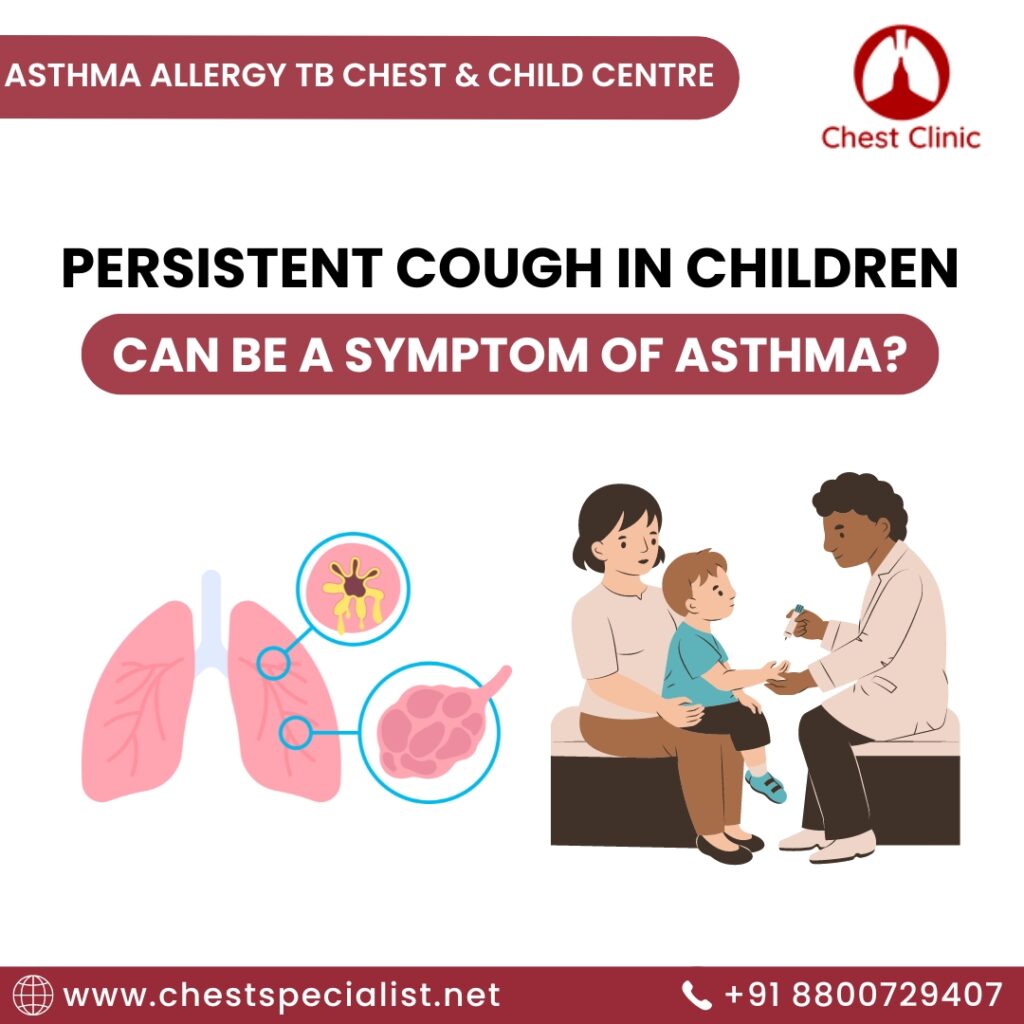chestspecialist development2024-06-26T11:42:59+00:00
Typically, a cough in children resolves within 2 to 3 weeks. However, a cough lasting beyond 4 weeks is considered a chronic cough. This can be very disruptive, leading to sleep disturbances, school absenteeism, and mood changes. Unfortunately, many children with a chronic cough do not receive a proper diagnosis. Parents often resort to over-the-counter cough syrups, antibiotics, and nebulizations. This article will discuss the causes, evaluation, and treatment of persistent cough in children.
Causes of Persistent Cough in Children
The most common causes of persistent cough in children include:
- Repeated viral infections
- Repeated Wheezing
- Childhood Asthma
- Allergies Allergic rhinitis or sinusitis
- Pneumonia
- Aspiration Disorders
- Tuberculosis
- Chronic Pneumonia
Less common causes include:
- Suppurative lung disease
- Bronchiectasis
- Cystic fibrosis
- Gastroesophageal reflux disease (GERD)

Asthma and Persistent Cough
Asthma is a significant cause of chronic cough in children. Indicators that asthma may be the cause include:
- Cough worsening with physical activities like running or sports
- Cough triggered by allergens (dust mites, pollen, pet dander) and irritants (cigarette smoke, perfumes)
- Associated symptoms such as wheezing, breathlessness, or chest pain
- Presence of other allergic conditions like nasal allergies, conjunctivitis, food allergies, and eczema
Children with asthma often show improvement with bronchodilator medications like salbutamol and steroids, which can help confirm the diagnosis.
Diagnostic Investigations for Persistent Cough
Evaluating a child with a chronic cough starts with a detailed case history and physical examination. Key diagnostic steps include:
- Listening for wheezing sounds in the chest with a stethoscope
- Identifying other allergic manifestations (eye allergies, nasal allergies, eczema)
- Conducting lung function tests, with spirometry being the most common method
- Using Impulse Oscillometry for young children aged 3 to 6 years
Additional tests may include:
- Chest and sinus X-rays
- Advanced investigations such as a CT scan of the chest, sweat chloride tests, and bronchoscopy, depending on individual cases
Treatment of Persistent Cough
Treatment is tailored to the underlying cause:
- Asthma: Inhaled corticosteroids administered with an inhaler and spacer
- Allergic rhinitis: Corticosteroid nasal sprays
- Sinusitis: Prolonged course of antibiotics
If your child’s cough persists beyond four weeks, it is crucial to consult a child pulmonologist for a thorough evaluation, accurate diagnosis, and appropriate treatment.
Seeking top-notch Pediatric pulmonologist in Delhi? Schedule a consultation with Dr. Jasmeet Kaur Wadhwa, MBBS (LHMC), DCH (MAMC), DNB (SGRH), Fellowship Pediatric Pulmonology (AIIMS), Diploma in Pediatric Sleep Medicine (Colorado, USA), European Diploma of Pediatric Respiratory Medicine (Switzerland), Consultant Pulmonologist, Bronchoscopist, Allergist, and Sleep Specialist, at Chest Clinic. Specializing in asthma, allergy, TB, chest diseases, and sleep medicine, Dr. Wadhwa offers personalized care with cutting-edge diagnostic tests and treatments. Breathe easier with the expert team at Chest Clinic!

Leave a Reply